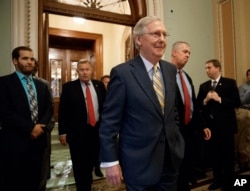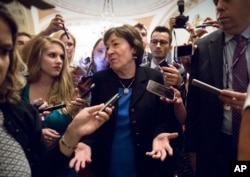U.S. President Donald Trump is ramping up pressure on Republicans to pass a new health care law, saying there has been “enough talk and no action.”
Speaking in the White House Blue Room on Monday, Trump scolded Senate Republicans, saying they have not kept their promise to repeal and replace the current health care law, the Affordable Care Act (ACA), which was championed by former President Barack Obama.
“Any senator who votes against starting debate is telling America you are fine with the Obamacare nightmare,” said Trump, who was surrounded by several families the White House referred to as “victims of Obamacare,” as the ACA has become known.
The Senate is headed toward crucial votes this week on whether to repeal the seven-year-old law, which national surveys show Americans view more favorably than Republican proposals to replace it.
“For senate Republicans, this is their chance to keep their promise,” Trump said. “Over and over again they said, ‘Repeal and replace, repeal and replace.’ They can now keep their promise to the American people.”
Fresh attacks
Trump also tore into Obama's health care law with fresh intensity, calling it a “government takeover” of health care and “big, fat, ugly lie” that had “wreaked havoc” on American families.
“They run out and say, Death! Death! Death!” Trump said, referring to critics of the Republican health care proposals. “Well Obamacare is death. That's the one that's death. And besides that, it's failing so you won't have it anyway,” Trump said.
But with unified Democratic opposition to repealing the ACA, it is unclear whether Republican Senate leaders have enough votes to even formally start debate on changes in the law. Republicans hold a narrow 52-48 edge in the chamber, meaning they can only lose two dissenting votes, with Vice President Mike Pence casting the deciding repeal vote in the event of a 50-50 tie.
Several Republican lawmakers, despite Trump's campaign vow to upend Obamacare, have announced their opposition to starting debate on the repeal effort, either because they contend that the changes do not go far enough to undermine the law or go too far and would curb health insurance coverage for millions of people, particularly impoverished Americans.
During the past month, the Senate has looked at two versions of health care bills, one that would both repeal and replace the current health care law, and another that would repeal the law, but with a two-year delay to give lawmakers time to figure out a replacement.
Both bills face total opposition from Democrats and so far enough resistance from Republicans that neither measure has advanced far in the legislative process.
Procedural vote
Republican Senators John Barrasso and John Cornyn said Monday that Majority Leader Mitch McConnell will hold a procedural vote Tuesday on a health care bill that would open up the measure to debate and amendments. Prior to the procedural vote, Cornyn said the various health care bill options would be discussed at a lunch Tuesday.
What is not clear is which bill will be voted on. The House of Representatives passed its own repeal-and-replace legislation in May, a bill Trump applauded at a White House rally after its passage and then later described as “mean.” He instead called for the Senate to approve legislation with more “heart.”
“We don't know whether we're going to be voting on the House bill, the first version of the Senate bill, the second version of the Senate bill, a new version of the Senate bill, or a 2015 bill that would have repealed the Affordable Care Act,” Republican Senator Susan Collins said.
Democrats were in control of Congress when they approved the law in 2010, without a single Republican vote.
About 20 million people gained insurance coverage under the law, which prevented insurance companies from denying coverage to people based on pre-existing medical conditions and required insurers to include a range of medical services in their plans.
During Obama's remaining years in office, Republicans dozens of times attempted to repeal the law and once succeeded in passing repeal legislation, which Obama quickly vetoed. He told Congress that if it sent him something that improved the law or the health system, then he would support it.
The non-partisan Congressional Budget Office has concluded that if Obamacare is repealed without a replacement, 17 million Americans would lose their health insurance next year and 32 million by 2026.
Under a Senate Republican repeal-and-replace proposal, the CBO said 22 million would lose their coverage in the next decade, but the plan would save the government $420 billion.






